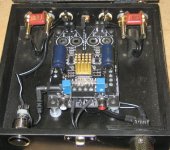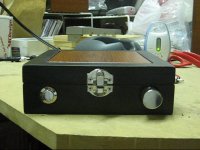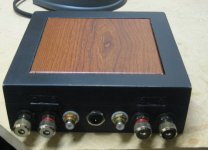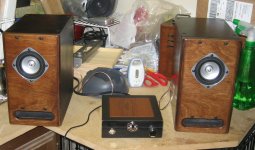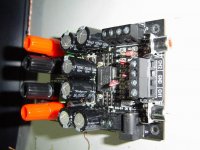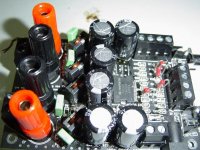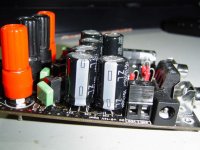Hi Paul,
Thank you so much for your advice 🙂 I will try to do as you told me. If i have any question, i will
ask for sure. Thank U once again. You are so kind to me. Take care & Have a nice day 🙂
Thank you so much for your advice 🙂 I will try to do as you told me. If i have any question, i will
ask for sure. Thank U once again. You are so kind to me. Take care & Have a nice day 🙂
Here is picture of my finished modified Sureelectronic Tripath 2024 amp. This is my first attempt at building my own amp (Not including the unfortunate Sonic T-Amp I mess up while learning to solder 🙂.
I did the following mods to my Sureelectronic board based on this and other Tripath amp threads on Diyaudio.
Removed C-3 & C-24
Removed R-3 & R-16
Removed Input Caps C13 & C21 and replaced with EPCOS MKT 2.2-MFD Input Caps (DigiKey # 495-1127-ND)
Remove C7 & C16 and replaced with CAP POLYPROPYLENE .15UF 50V 1% Across speaker binding posts (DigiKey # P3876-ND)
Used DUAL SHIELDED RCA AUDIO CABLE to wire everything up (allelectronics #DCB-300)
Added Panasonic EVJ-Y91F03B54 Potentiometer (DigiKey # P2E9503-ND0)
Added Large Ferrite Bead to feed the output wires through (Electronic Goldmine # G16324)
Power comes from a Samsung #AD-4212L 12v 3.5a PSU.
I found a 6” wooden tile box at local Hobby Lobby Craft store that seemed a perfect fit for the Sureelectronic Tripath board. I wanted to match my DelSol speaker so I used Con-tact Brand Cherry Wood Grain drawer liner paper to cover the original tile. I found a nickel button switch, latch and Telecaster style barrel knob to finish off the amp.
I did the following mods to my Sureelectronic board based on this and other Tripath amp threads on Diyaudio.
Removed C-3 & C-24
Removed R-3 & R-16
Removed Input Caps C13 & C21 and replaced with EPCOS MKT 2.2-MFD Input Caps (DigiKey # 495-1127-ND)
Remove C7 & C16 and replaced with CAP POLYPROPYLENE .15UF 50V 1% Across speaker binding posts (DigiKey # P3876-ND)
Used DUAL SHIELDED RCA AUDIO CABLE to wire everything up (allelectronics #DCB-300)
Added Panasonic EVJ-Y91F03B54 Potentiometer (DigiKey # P2E9503-ND0)
Added Large Ferrite Bead to feed the output wires through (Electronic Goldmine # G16324)
Power comes from a Samsung #AD-4212L 12v 3.5a PSU.
I found a 6” wooden tile box at local Hobby Lobby Craft store that seemed a perfect fit for the Sureelectronic Tripath board. I wanted to match my DelSol speaker so I used Con-tact Brand Cherry Wood Grain drawer liner paper to cover the original tile. I found a nickel button switch, latch and Telecaster style barrel knob to finish off the amp.
Attachments
Care to share some impressions?
I have been thinking about using ZL, ZA or MCZ caps on the power rails. Good choice?
Notice that you have changed some caps on the output filter? Cant make out just where?
I have been thinking about using ZL, ZA or MCZ caps on the power rails. Good choice?
Notice that you have changed some caps on the output filter? Cant make out just where?
I did the basic mods that were listed previously. For the other items, I changed the gain and feedback resistors to 20k PRP type. The stock electrolytic caps and the 22uf cap on the power rails were all removed and replaced with six 1500uf Rubycon ZL caps. I replaced the inductors with SER1360 10uh inductors. I did not like the changes to the output filter caps. I would leave them alone and just replace the two that nbrophy replaced above with some polypropelenes.
I have no experience with the MCZ caps, and the ZA caps only come in 470uf, so I stuck with the ZL caps.
It sounds pretty good to me.
I have no experience with the MCZ caps, and the ZA caps only come in 470uf, so I stuck with the ZL caps.
It sounds pretty good to me.
One of my Sure boards has +20mV and -140mv offset.
Is this within the acceptable range? If not, is there a way to fix this ?
R-3 & R-16 have been removed.
Is this within the acceptable range? If not, is there a way to fix this ?
R-3 & R-16 have been removed.
cheric, 20 is safe, 140 is too much.
wen I removed R3,R16 I get 30-40mV. To lover this I remove R1,R2 and R15,R18 and solder 50K multi turn trimpot in this place, then solder R3,R16 back, 1Mohm this time.
With trim pot I can get +- 1mV offset.
Better use trim pot with triangular contacts, not in line,and screw to top, it sit on board perfectly.
wen I removed R3,R16 I get 30-40mV. To lover this I remove R1,R2 and R15,R18 and solder 50K multi turn trimpot in this place, then solder R3,R16 back, 1Mohm this time.
With trim pot I can get +- 1mV offset.
Better use trim pot with triangular contacts, not in line,and screw to top, it sit on board perfectly.
I am a little bit surprized, some of you add a volume control, a potentiometer at the input.
When I read the datasheet from the TA2024, then I find, that the inputs are inverting opamps, virtual grounds.
R7 and R3 are the feedback resistors, setting the gain in relation to R8 and R14.
The volume control is, concerning AC, in parallel with R8 and R14, therefore influencing the gain.
It would be worth to add a buffer, when using volume controls.
Kind regards
Franz
When I read the datasheet from the TA2024, then I find, that the inputs are inverting opamps, virtual grounds.
R7 and R3 are the feedback resistors, setting the gain in relation to R8 and R14.
The volume control is, concerning AC, in parallel with R8 and R14, therefore influencing the gain.
It would be worth to add a buffer, when using volume controls.
Kind regards
Franz
R7 and R3 are the feedback resistors, setting the gain in relation to R8 and R14.
This was wrong.
Correctly:
R7 and R13 are the feedback resistors, setting the gain in relation to R8 and R14.
Franz
volume pots on R7 and R13?
Franz, there are better places to put a volume control than on the input?
Thanks,
Mack
Franz, there are better places to put a volume control than on the input?
Thanks,
Mack
Franz,
I think you may be on to something, though I have changed a lot of things in the past few days.
My current setup is:
Astec 12v 5a linear power supply with 2 Vishay 36D 3900uf caps on the output.
Standard modded sure board (just DC resistors and input caps changed) with EPCOS MKV capacitors.
Removed volume pot (using VTL preamp for volume).
Sound is really 3D and wide now. When I migrate the amp to the new case I am probably going to use one of the boards that Dweekie showed above and a few more caps in the PSU.
I really like the linear vs. the SMPS but the linear was kind of flat without the PSU caps installed, very detailed but very thin as well. I am going to try bypassing the 36Ds with panasonic FMs to see if that helps or hurts.
These boards are fun...its really hard to make them sound crappy.
I think you may be on to something, though I have changed a lot of things in the past few days.
My current setup is:
Astec 12v 5a linear power supply with 2 Vishay 36D 3900uf caps on the output.
Standard modded sure board (just DC resistors and input caps changed) with EPCOS MKV capacitors.
Removed volume pot (using VTL preamp for volume).
Sound is really 3D and wide now. When I migrate the amp to the new case I am probably going to use one of the boards that Dweekie showed above and a few more caps in the PSU.
I really like the linear vs. the SMPS but the linear was kind of flat without the PSU caps installed, very detailed but very thin as well. I am going to try bypassing the 36Ds with panasonic FMs to see if that helps or hurts.
These boards are fun...its really hard to make them sound crappy.

Franz Gysi said:I am a little bit surprized, some of you add a volume control, a potentiometer at the input.
When I read the datasheet from the TA2024, then I find, that the inputs are inverting opamps, virtual grounds.
R7 and R3 are the feedback resistors, setting the gain in relation to R8 and R14.
The volume control is, concerning AC, in parallel with R8 and R14, therefore influencing the gain.
It would be worth to add a buffer, when using volume controls.
Kind regards
Franz
Thanks for the info Franz. Considering all that, when a preamp is not available and you are really forced to use a pot, which one do you think would be the most suitable 25K, 50K or 100K?
I'm currently using a 100K one but I'm not satisfied with the volume level (I also did the increase gain mod and I'm using 4 ohm speakers).
- Status
- Not open for further replies.
- Home
- Amplifiers
- Class D
- Sure Electronics Tripath boards?
